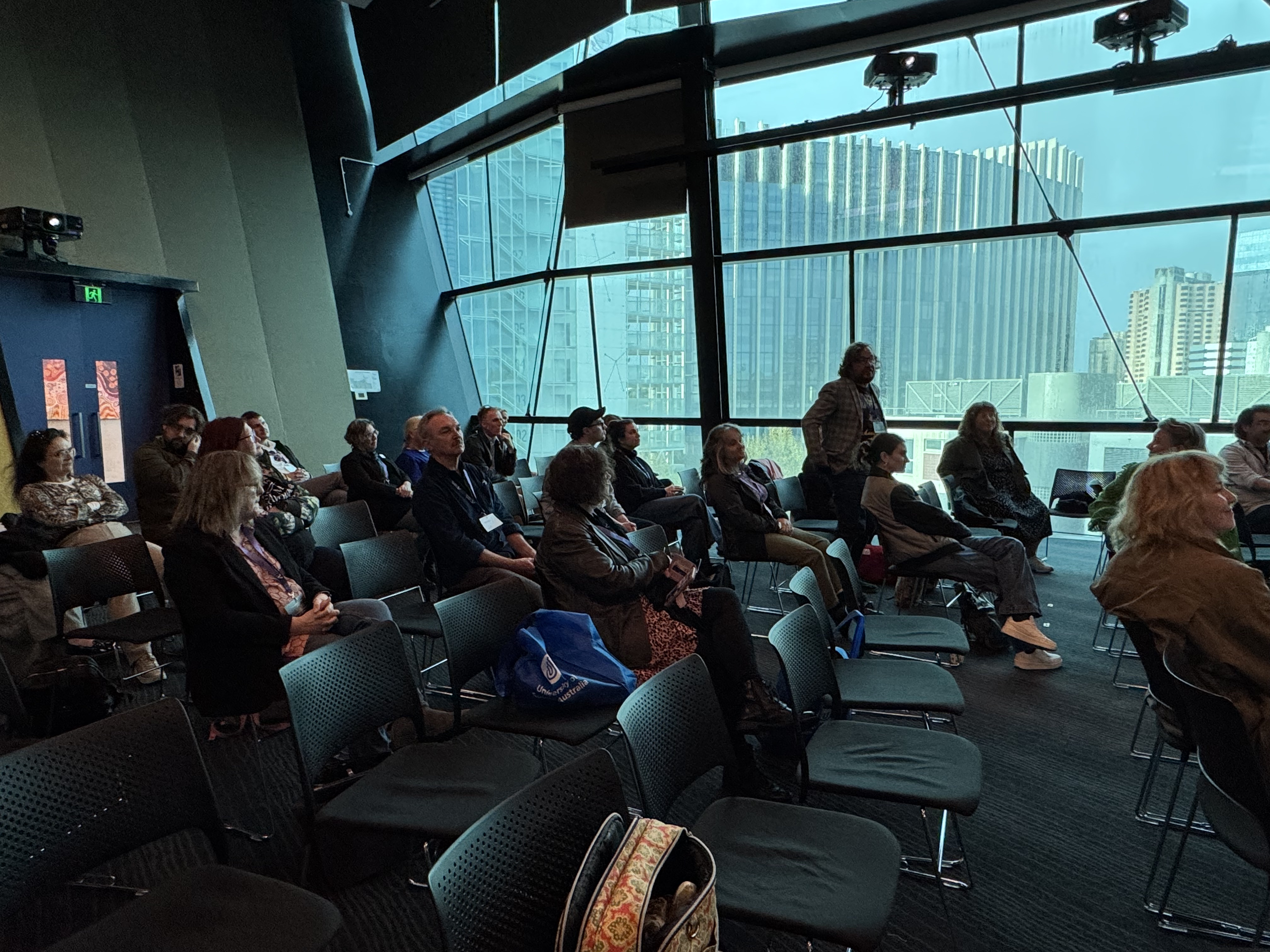Screenwriting Research Network Conference + Sightlines Festival: University of South Australia, 17th – 20th September
by Kim Munro
Taking the theme of ‘hyphen’, the combined Screenwriting Research Network (SRN) conference and the Sightlines: Filmmaking in the Academy festival aimed to highlight the many hyphenated identities that we occupy as creative researchers in the academy. The hyphen is the space in-between, it is what connects, but also what separates. Taking place at the University of South Australia in Adelaide from17th-20th September 2025, the theme of bridging two identities was very much in the air, underpinned by the fact that the university is currently merging with the University of Adelaide. Having said that, hyphenation leans more towards a ‘together-apart’ identity than a full-scale blend. Around eighty delegates attended from Australia and Aotearoa/New Zealand as well as Estonia, Brazil, Hong Kong, Bangladesh, the US and the UK, among others.

Bradley Forum – University of South Australia
The event launched on Wednesday afternoon with an in-conversation-keynote with local filmmaker Sophie Hyde, who began with an exercise where she asked the audience a series of questions: Who has a pet, who is from overseas, who lives alone - all of which set a tone that was both relational and thoughtful, personal and political. Hyde connected her filmmaking process to her background in theatre, posing the idea behind making her latest film, Jimpa as a question of what-if? Based on the story of her own family and witnessing her child growing up as queer and non-binary, Hyde wondered what would happen if their child, Aud, could have a conversation with her queer dad who had passed away. Setting the scene of the speculative possibilities of screenwriting and filmmaking, these provocations echoed throughout the three days that followed.

Michael Keerdo-Dawson and Angie Black
My experience at the conference was partial with often three parallel sessions to choose from. The two practices of screenwriting and filmmaking often overlapped and the two disciplines made for good panel companions. A central part of the conference was the was the film-screenings, held in the Mercury Cinema adjacent to the university. Some of the films were not entirely finished, so the discussion turned to process. For example, Angie Black and Michael Keerdo-Dawson presented extended clips from their cross-continent collaboration, Permission to Leave, as they discussed the messy but generative work of bringing together practices and research questions across filming in Australia and Estonia. Among other films that explored the speculative potential of filmmaking as research included Siobhan Jackson’s experimental essay-documentary, Love Poem inspired by her relationship with her daughters which used personal archival footage and text messages, Helen Gaynor’s Calm the F*ck Down, which explored male violence through workshops with female actors, and Kerreen Ely-Harper’s first person documentary, Closer to the Bone about her family’s secrets. Emerging from many of these discussions was that despite the difficulty of making films inside the academy due to time and money pressures, there is creative freedom to experiment with form.
As with much practice-research, the inclusion of the ‘personal’ as inciting-incident was strong. In one of the final presentations of the conference, screen-writer-filmmaker, Gillian Ashurst introduced herself alongside her professional identities, she is also a ‘mother’. Ashurst went on to discuss how the birth of her daughter with Down syndrome, and being told that she would never become a poet or an astronaut, had inspired her hybrid science-fiction film, Inheritance. Casting her daughter as the astronaut, Ashurst challenged industry conventions and modes of production through creating conditions that served both the story and her family.
Book-ending the conference on the final day was Christy Dena’s keynote on narrative change and story design. Dena, a multi-hyphenate herself who works across academia, games, activism and writing, challenged the dominant model of conflict in narratives, inviting a more emancipatory model of change through a character’s motivation and love. This far-ranging talk drew together many threads, including reflecting on presentations and conversations from the previous days, to ask what kind of stories might shape a better present and future, animated by Antonio Gramsci’s idea of “good sense” over “common sense”.

Christy Dena’s keynote
At the end of the conference, four deleagtes representing a range of perspectives and career-stages were invited to reflect on what resonated with them, with all agreeing on the richness of bringing together the two conferences, and the importance of networks. Throughout the three days, I had many conversations with friends and peers who all expressed gratitude that despite financial pressures, limited funding, and global and climate crises, being together in person with those who share an interest in exploring the possibilities of practice-research was invaluable and increasingly rare.
